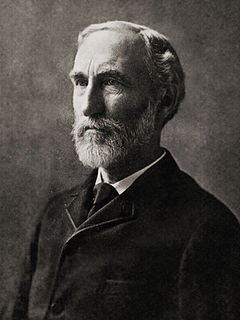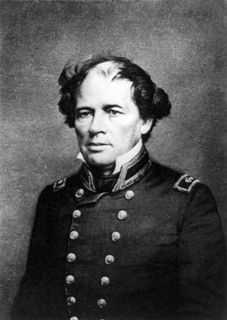A Quote by William John Macquorn Rankine
It is possible to express the laws of thermodynamics in the form of independent principles , deduced by induction from the facts of observation and experiment, without reference to any hypothesis as to the occult molecular operations with which the sensible phenomena may be conceived to be connected; and that course will be followed in the body of the present treatise. But, in giving a brief historical sketch of the progress of thermodynamics, the progress of the hypothesis of thermic molecular motions cannot be wholly separated from that of the purely inductive theory.
Quote Topics
Any
Body
Brief
Cannot
Conceived
Connected
Course
Experiment
Express
Facts
Followed
Form
Giving
Historical
Hypothesis
Independent
Inductive
Laws
May
Molecular
Motions
Observation
Occult
Operations
Phenomena
Possible
Present
Principles
Progress
Purely
Reference
Sensible
Separated
Sketch
Theory
Thermodynamics
Which
Wholly
Will
Without
Related Quotes
In thermodynamics as well as in other branches of molecular physics , the laws of phenomena have to a certain extent been anticipated, and their investigation facilitated, by the aid of hypotheses as to occult molecular structures and motions with which such phenomena are assumed to be connected. The hypothesis which has answered that purpose in the case of thermodynamics, is called that of "molecular vortices," or otherwise, the "centrifugal theory of elasticity.
[Coining phrase "null hypothesis"] In relation to any experiment we may speak of this hypothesis as the "null hypothesis," and it should be noted that the null hypothesis is never proved or established, but is possibly disproved, in the course of experimentation. Every experiment may be said to exist only in order to give the facts a chance of disproving the null hypothesis.
Mr. Darwin's hypothesis is not, so far as I am aware, inconsistent with any known biological fact; on the contrary, if admitted, the facts of Development, of Comparative Anatomy, of Geographical Distribution, and of Palaeontology, become connected together, and exhibit a meaning such as they never possessed before; and I, for one, am fully convinced that if not precisely true, that hypothesis is as near an approximation to the truth as, for example, the Copernican hypothesis was to the true theory of the planetary motions.
The hypothesis of molecular vortices is defined to be that which assumes - that each atom of matter consists of a nucleus or central point enveloped by an elastic atmosphere, which is retained in its position by attractive forces, and that the elasticity due to heat arises from the centrifugal force of those atmospheres revolving or oscillating about their nuclei or central points.According to this hypothesis, quantity of heat is the vis viva of the molecular revolutions or oscillations.
The effects of heat are subject to constant laws which cannot be discovered without the aid of mathematical analysis. The object of the theory is to demonstrate these laws; it reduces all physical researches on the propagation of heat, to problems of the integral calculus, whose elements are given by experiment. No subject has more extensive relations with the progress of industry and the natural sciences; for the action of heat is always present, it influences the processes of the arts, and occurs in all the phenomena of the universe.
I have not been able to discover the cause of those properties of gravity from phenomena, and I frame no hypotheses; for whatever is not deduced from the phenomena is to be called a hypothesis, and hypotheses, whether metaphysical or physical, whether of occult qualities or mechanical, have no place in experimental philosophy.
The laws of thermodynamics may be regarded as particular cases of more general laws, applicable to all such states of matter as constitute Energy , or the capacity to perform work, which more general laws form the basis of the science of energetics, a science comprehending, as special branches, the theories of motion, heat, light , electricity , and all other physical phenomena.
It surely can be no offence to state, that the progress of science has led to new views, and that the consequences that can be deduced from the knowledge of a hundred facts may be very different from those deducible from five. It is also possible that the facts first known may be the exceptions to a rule and not the rule itself, and generalisations from these first-known facts, though useful at the time, may be highly mischievous, and impede the progress of the science if retained when it has made some advance.
It is a remarkable fact that the second law of thermodynamics has played in the history of science a fundamental role far beyond its original scope. Suffice it to mention Boltzmann's work on kinetic theory, Planck's discovery of quantum theory or Einstein's theory of spontaneous emission, which were all based on the second law of thermodynamics.
Keynes was a great economist. In every discipline, progress comes from people who make hypotheses, most of which turn out to be wrong, but all of which ultimately point to the right answer. Now Keynes, in 'The General Theory of Employment, Interest and Money,' set forth a hypothesis which was a beautiful one, and it really altered the shape of economics. But it turned out that it was a wrong hypothesis. That doesn't mean that he wasn't a great man!
No theory ever agrees with all the facts in its domain, yet it is not always the theory that is to blame. Facts are constituted by older ideologies, and a clash between facts and theories may be proof of progress. It is also a first step in our attempt to find the principles implicit in familiar observational notions.
The laws of thermodynamics, as empirically determined, express the approximate and probable behavior of systems of a great number of particles, or, more precisely, they express the laws of mechanics for such systems as they appear to beings who have not the fineness of perception to enable them to appreciate quantities of the order of magnitude of those which relate to single particles, and who cannot repeat their experiments often enough to obtain any but the most probable results.
This general tendency to eliminate, by means of unverifiable speculations, the limits of the categories nature presents to us is the inheritance of biology from The Origin of Species. To establish the continuity required by theory, historical arguments are invoked, even though historical evidence is lacking. Thus are engendered those fragile towers of hypothesis based on hypothesis, where fact and fiction intermingle in an inextricable confusion.

































